#东方青苍
Text

DFQC & XLH | Enjoying each other's presence…
#Doesn't DFQC look better with his beloved XLH than with a book and wine? (I needed this in the drama)#The warmest and most comfortable couple in the world!#this couple warms my soul😊#And he also looks like a teddy bear that definitely needs to be hugged 24/7. So plush and soft...#cang lan jue#东方青苍#苍兰诀#cdrama#clj#xiao lanhua#moon supreme#dfqc#xia lan hua#art#clj fan art#fan art#love between fairy and devil#lbfad#clj-art-blog#my 22nd clj art
354 notes
·
View notes
Text


Episode 9 will always be iconic
#lbfad#love between fairy and devil#canglan jue#cang lan jue#canglan#clj#dfqc#dongfang qingcang#memes#fan art#my art#东方青苍#苍兰诀
139 notes
·
View notes
Photo

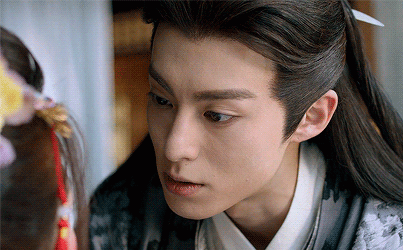
苍兰诀 (2022) - Episode 23
#东方青苍#苍兰诀#cang lan jue#love between fairy and devil#cdrama#cdramaedit#wang hedi#dylan wang#lbfad#dongfang qingcang#dongfang yuanwai#this outfir is soooo delicious#i feel so normal about him i feel completely normal and regular about him#i wouldnt rip my torso open for him to crawl in and keep warm if he wanted to that would be crazy#sidney talks shit
290 notes
·
View notes
Text
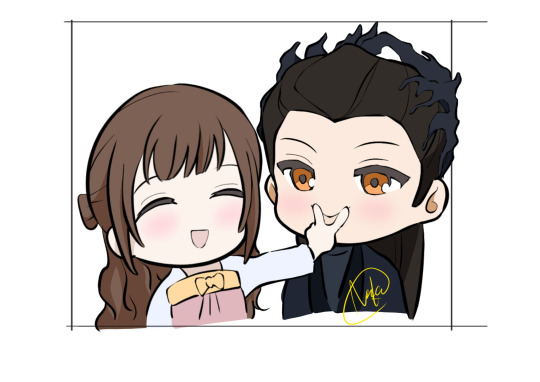
40 notes
·
View notes
Text







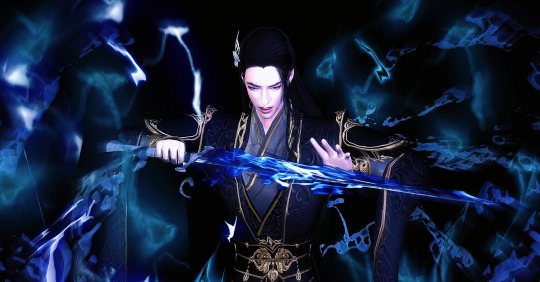


【东方青苍】
DOWNLOAD (free):
https://www.patreon.com/posts/72813551
T.0.U:
1 .不要二次上传我的人物 | Don't re-upload as your own
2.不要盗卖我的人物」Don't steal my characters
3.这些人物只有cc list和tary 」 These characters are only cc list and tary
#sims 4#traysims#ts4 character#sims4 edit#sims 4 simblr#lotus sim#sim#苍兰诀#东方青苍#sims#the sims 4#simblr#sims 4 download#ts4 download#ts4 sim tray#ts4mm
12 notes
·
View notes
Text
Character Names in LBFAD – Meaning and Significance
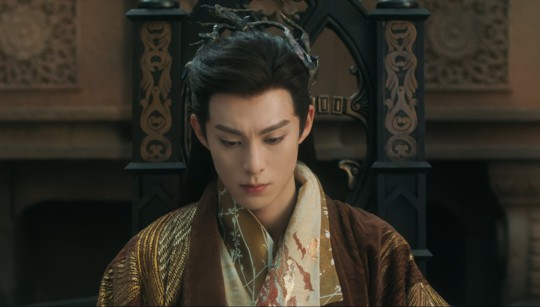
What’s in a name? For the characters of LBFAD (Love Between Fairy and Devil), a whole lot of hidden meanings! These are not apparent to English viewers. Here are my translations and interpretations of these meanings.
DongFang Qing Cang - 东方青苍: “East, Cyan, Dark blue”
The surname “DongFang” means East, the direction of the rising sun. Both Dongfang Qingcang’s (DFQC) personal terrace at Silent Moon Palace and the replica Arbiter Hall he built for Xiao Lanhua (XLH) face East, and capture the most beautiful sunrises. DFQC (and previous generations of DongFangs) are well-respected by their people and enjoy the best locations and residences in Cangyan Sea.
The “Cang” in DFQC was named for his realm, “Cang” Yan Sea, as he was expected to be its leader and follow the path set for him by his father, and Lady Yan before him. Lady Yan chose to rid herself of emotions in order to wield Hellfire, and DFQC’s father forced the same decision onto him. The hanzi (mandarin character) for “Cang” in DFQC and Cangyan Sea means dark blue, and the darkness of this colour represents the darkness of the path he was expected to follow.
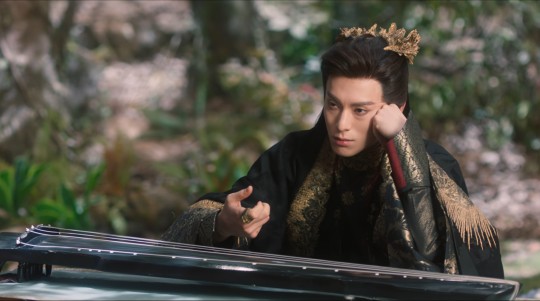
But “Cang” is not the only colour in DFQC’s name! The “Qing” in his name means lighter shades of blue/green, or cyan. And despite his prescribed mission to emotionlessly conquer the three realms, DFQC has many lighter, more peaceful shades to his character that reveal themselves as the series progresses. He forms a friendship and brotherhood with his enemy Changheng, who shares with him a love of playing music, art and cuju! And he rises above the cruel dictator of Shuiyuntian who almost annihilated his people, by sending his people to aid Shuiyuntian.
Xiao Lan Hua - 小兰花: “Little Orchid Flower”
We are first introduced to our female lead as “Xiao Lanhua”, which is not a name, but a description of what she believes her true form to be, a little orchid flower. But this was a disguise given to her by her parents and upheld by Siming. Her real name is Xiyun.
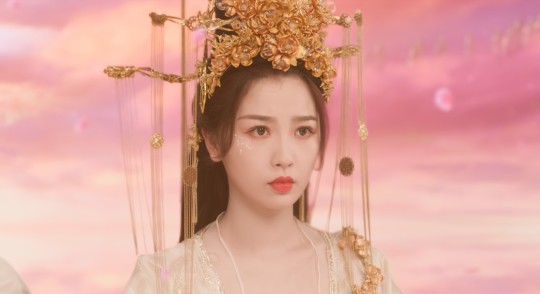
Xi Yun - 息芸: “Every breath”
The character for “Xi” in XLH’s true name is the same as the “Xi” in her realm, “Xishan”, and means breath (of life). Just like DFQC, she is named for her realm, as she was the intended leader of Xishan as its Goddess. The Xilan tribe of Xishan had powerful healing magics, and hers is the most powerful of all, with the ability to resurrect the dead with her blood, thus providing the breath of life. She uses this to great effect, resurrecting DFQC in ep. 26, everyone who died on the battlefield in ep. 31, and freeing the 100,000 sealed soldiers of the Moon Tribe.
The “Yun” in her name meaning every, combined with “Xi” can be interpreted as “every breath”. Sadly, XLH’s every breath is for one purpose and brings her closer to her one destiny. She is fated to sacrifice herself to save the three realms from Taisui. If this had happened, then like Lady Chidi before her, her sacrifice would soon have been forgotten.
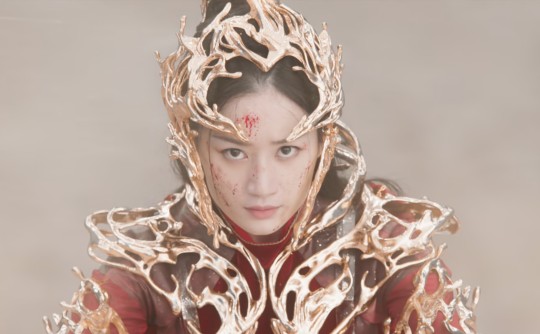
Chi Di - 赤地: “Red/Barren Earth”
The “Chi” in Lady Chidi’s name means red, and paired with “Di” meaning earth, can also mean barren earth. She is the only official in Shuiyuntian seen wearing Red, as even the current God of War, Changheng, conforms to the same white and pale blue robes that other officials wear. Chidi is therefore a standout who asserts her individuality and does not conform to expectations. Her way of thinking outside the box, led to DFQC and his 100,000 Moon Tribe soldiers being completely blindsided by her sacrifice 30,000 years ago. It also led to her breaking heaven’s laws to resurrect Ronghao, to her later detriment.
Chidi wields powerful earth magics, as represented by her name. These are so powerful that she is able to seal the 100,000 soldiers of the Moon Tribe within the barren earth of Xuanxu realm. Her mighty Shuofeng sword is also swallowed by the barren earth and her magic cannot be reversed without her primordial spirit.
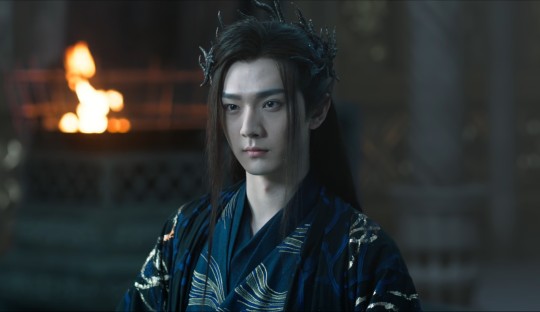
Xun Feng - 巽风: “Obedient wind”
The “Xun” in Xunfeng means to obey, and the “Feng” means wind. His name can be interpreted as either “obedient to the wind” or an “obedient wind”. Like the wind, Xunfeng lacks substance, confidence and ability, and is disrespected by his people during DFQC’s imprisonment. Many contenders try to steal his position as Moon Supreme, and he almost dies on the Wind Plain until DFQC arrives to save him.
But Xunfeng cares fiercely for his people. In his attempt to protect them, he collaborates with Ronghao without knowing his identity or motivations. He is thus “obedient to the wind” where Ronghao is an unknown and unseen entity, like the wind. Xunfeng is unable to discern that Ronghao is keeping Cangyan Sea in a constant state of civil unrest and tormenting the souls of deceased Moon Tribe members until much later, with DFQC’s help!
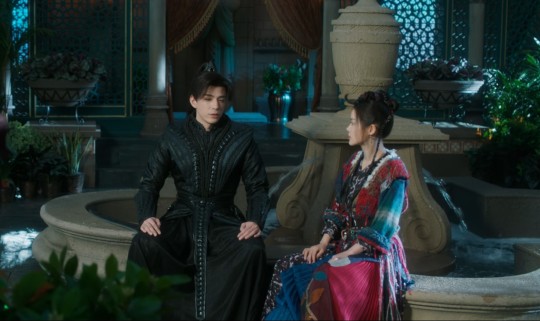
Shang Que - 觞阙: “Watchtower”
“Que” meaning watchtower is an apt description for DFQC’s lieutenant and right-hand man. Shangque has many talents suiting him to this role! These include his ability to be stealthy, gather information discreetly, undertake covert missions successfully, act as a powerful defensive force, and a healing one due to his skill with Chinese medicine. Like a watchtower, he kept watch for 30,000 years during DFQC’s absence on all events occurring within the three realms. His loyalty and love for DFQC, whom he views as a brother and whose return he awaited for 30,000 years, are astounding!
“Shang” paired with “Que” can mean lacking sustenance. This is the state Shangque was in when orphaned as a young boy, and many tried to take advantage of him and his dragon body. If not for DFQC saving him, he would likely have perished from hunger or been murdered :(
Jie Li - 结黎: “Dark knot”
Jieli suffers from much internal torment which is like a dark knot inside her. From the moment she was born, she never knew or received love, and was raised by people who continually exploited her, physically harming her and threatening her life. That she is even capable of loving and caring for others is a miracle! Unlike Shangque, nobody like DFQC ever stepped in to save her and care for her.
Jieli cares deeply for both XLH and Shangque. Her life under threat, she makes some bad choices such as spilling a drop of Chidi’s blood onto the Bone Orchid. This is one of many dark and knotty situations she encounters. Although she soon decides she would rather die than hurt XLH, Dieyi poisons Shangque to force her obedience.
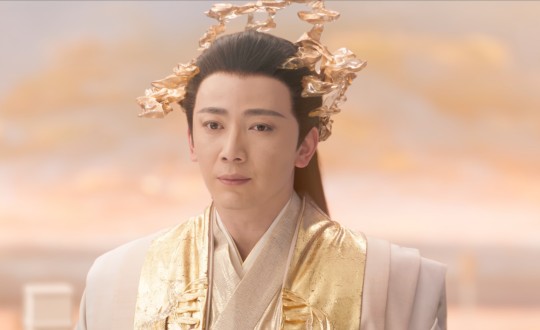
Yun Zhong - 云中: “Among the clouds”
Yunzhong literally lives among the clouds, but his head is also in the clouds. He is very narrow-minded and cannot think outside the box. When XLH does not fit within the eight-class system of Shuiyuntian, he immediately decides she is Moon Tribe (even before the Bone Orchid protects her) without considering other possibilities. He is so strict with Changheng that he would rather execute the most powerful asset to Shuiyuntian (and his brother!!) than tolerate the slightest disobedience! Throughout the series, he is intent on exterminating the Moon Tribe and almost does in ep. 31 on completely false pretences.
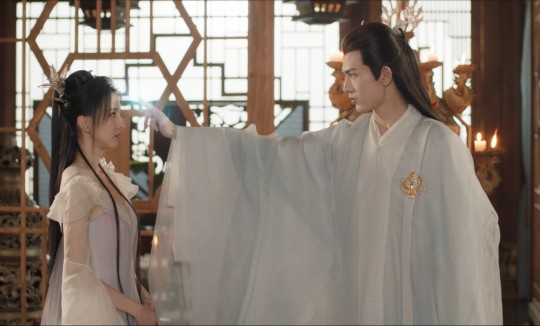
Chang Heng - 长珩: “Steadfast bird”
Like the golden bird brooches that the celestials wear to represent their tribe, Changheng is a model citizen of Shuiyuntian. He is steadfast and loyal to his duties and puts these above his personal desires. When trying to rescue XLH from Cangyan Sea in ep. 13, he is honest with her that he cannot break the rules of Shuiyuntian, and only hopes that Yunzhong will be reasonable and lenient towards her! Changheng is far more steadfast and loyal than the average celestial. He is the only one apart from Ronghao to visit Chidi’s grave on her death anniversary, honours his brotherhood with DFQC after returning to the immortal world, and after learning Ronghao’s secret identity, listens to his side of the story.
Dan Yin - 丹音: “Crimson tidings”
Twice, Danyin is the bearer of important news, relaying her visions from the Tianji mirror to the sacrifice of her own desires. First, she tells a wounded and imprisoned Changheng about his wedding to XLH in the mortal realm, causing him to start a mortal tribulation. Then, she tells Yunzhong and the High Council about XLH’s true identity as the Goddess, saving Changheng from execution and leading to his wedding with XLH.
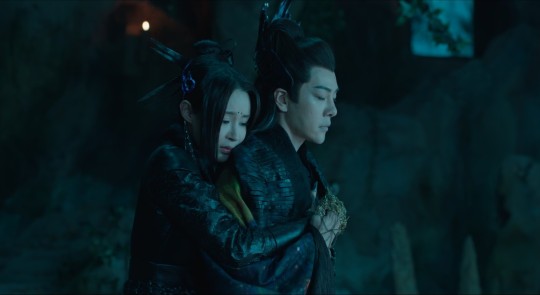
Rong Hao - 容昊: “Vastly compromising”
Ronghao has “one tiny earthly desire”, that his beloved master can live. What he is prepared to do to achieve this includes burning the souls of dead celestials and Moon tribe, massacring the entire Xilan population including their women and children, forcing his master to endure 30,000 years of cruel mortal tribulations and using evil qi to keep her alive. His willingness to vastly compromise both himself and her leaves Lady Chidi aghast.
Die Yi - 蝶衣: “Butterfly costume”
Dieyi is a shape-shifter and the different forms she takes, butterfly or woman, are her costumes, which help her to be sneaky and nefarious.
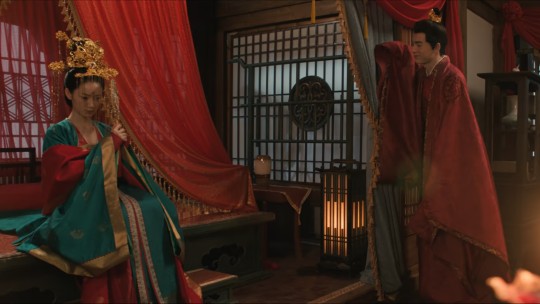
Xie Wanqing - 谢惋卿: “Withering sigh”
Having forgotten her life as Lady Chidi, Xie Wanqing feels incomplete without knowing why, expressed by her sad sighs. Chidi is forced to endure countless mortal tribulations just like this one and die (wither) repeatedly. (In the novel, in each of these lives she is condemned to be murdered by the one she loves!)
Xiao Run - 萧润: “Mournful wealth”
Both Xiao Run and his true self as Changheng come from positions of wealth and noble status. But both of them mourn the loss of freedom that comes from this – although Xiao Run is more of a carefree rebel! :D
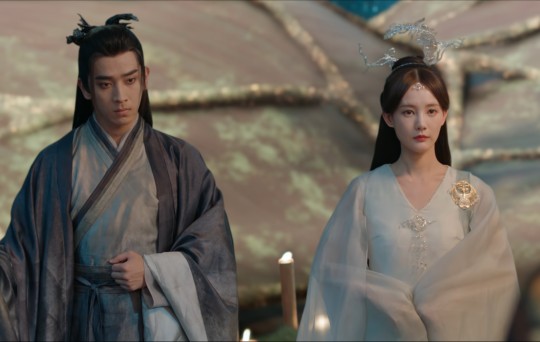
Si Ming - 司命: “Arbiter of fate”
Using the power of her position as Arbiter of Fate, Siming has repeatedly defied heaven’s laws and changed fate! She resurrects Ronghao as an immortal, creating a new destiny leaf for him. She released the convicted dragon Chang Yuan and married him. And she instructs DFQC on how to also defy nature’s laws and change destiny! :D
Chang Yuan - 长渊 “Steadfast abyss”
He is the deep abyss that Siming falls into, as in choosing him, she accepts the fate of being imprisoned with him in the Ruins of Myriad Heavens for the rest of eternity. But at least he is steadfastly loyal to her.
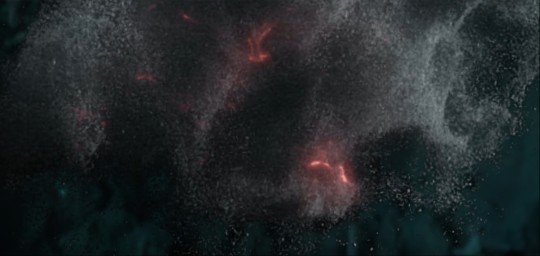
Tai Sui - 太岁: “Very Ancient”
This most ancient of tricksters could not be defeated by numerous generations of Goddesses, who merely sealed him beneath Xishan. Over his very long life spanning hundreds of millenia, he has learned to tell whatever lies are needed to manipulate others and ensure his survival.

Here is a link to my article: Location Names in LBFAD – Meaning and Significance
All of my LBFAD articles can be viewed with the tag #lbfad reflections (hyperlinked) and the table of contents to these is here.
#lbfad#love between fairy and devil#canglan jue#clj#dongfang qingcang#dfqc#xiao lanhua#xlh#cdrama#lbfad meta#cang lan jue#lbfd#cdramasource#asiandramasource#asiandramanet#dylan wang#wang hedi#yu shuxin#esther yu#lbfad reflections
104 notes
·
View notes
Text
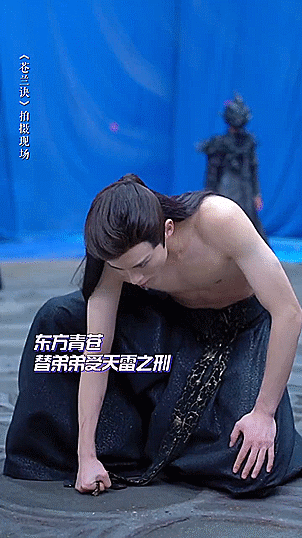

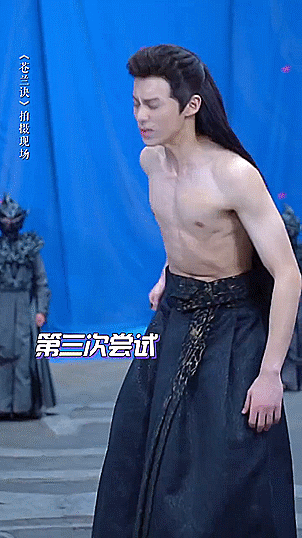

Cdrama: Love Between Fairy and Devil (2022)
#shorts 贴心觞阙给东方青苍披衣服,披了三次都没成功,东方青苍:我真的会谢!bro丨#苍兰诀
Watch this video on Youtube: https://www.youtube.com/shorts/LBcyC3eiyFA
#Love Between Fairy and Devil#苍兰诀#Mo Zun#Chong Laan Kyut#Mo Jeun#魔尊#蒼蘭訣#Parting of Orchid and Demon King#Cang Lan Jue#Eternal Love#Sweet on Series#2022#cdrama#chinese drama#shorts#short video#youtube#iQiyi#Yu Shu Xin#Xiao Lan Hua#Orchid#Dylan Wang#Wang He Di#Dongfang Qing Cang#Lin Bo Rui#Shang Que
73 notes
·
View notes
Photo
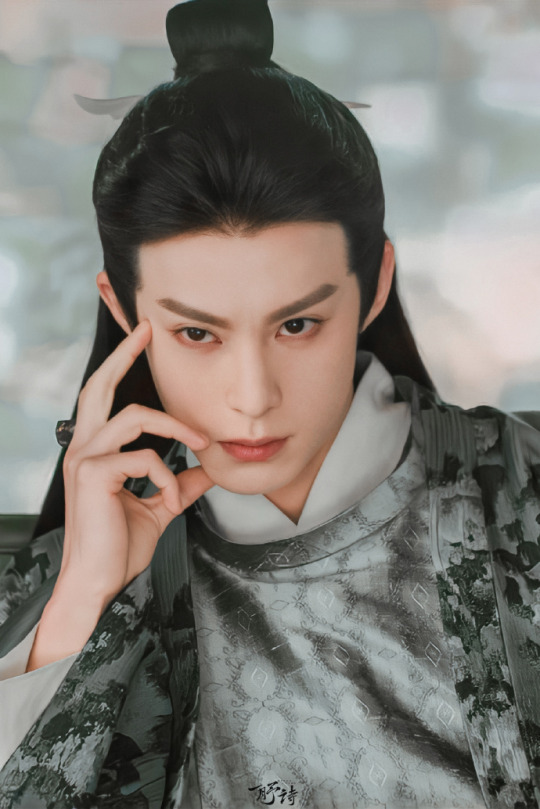


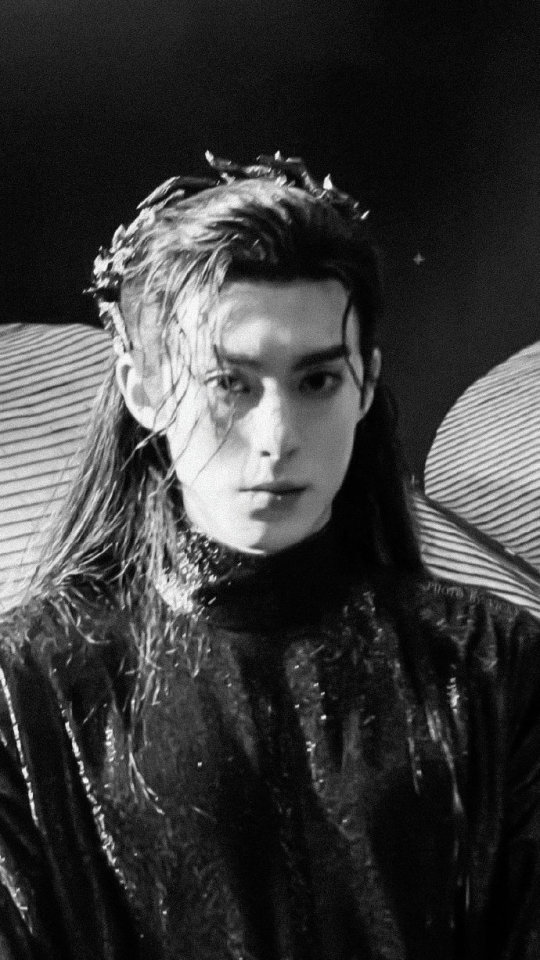

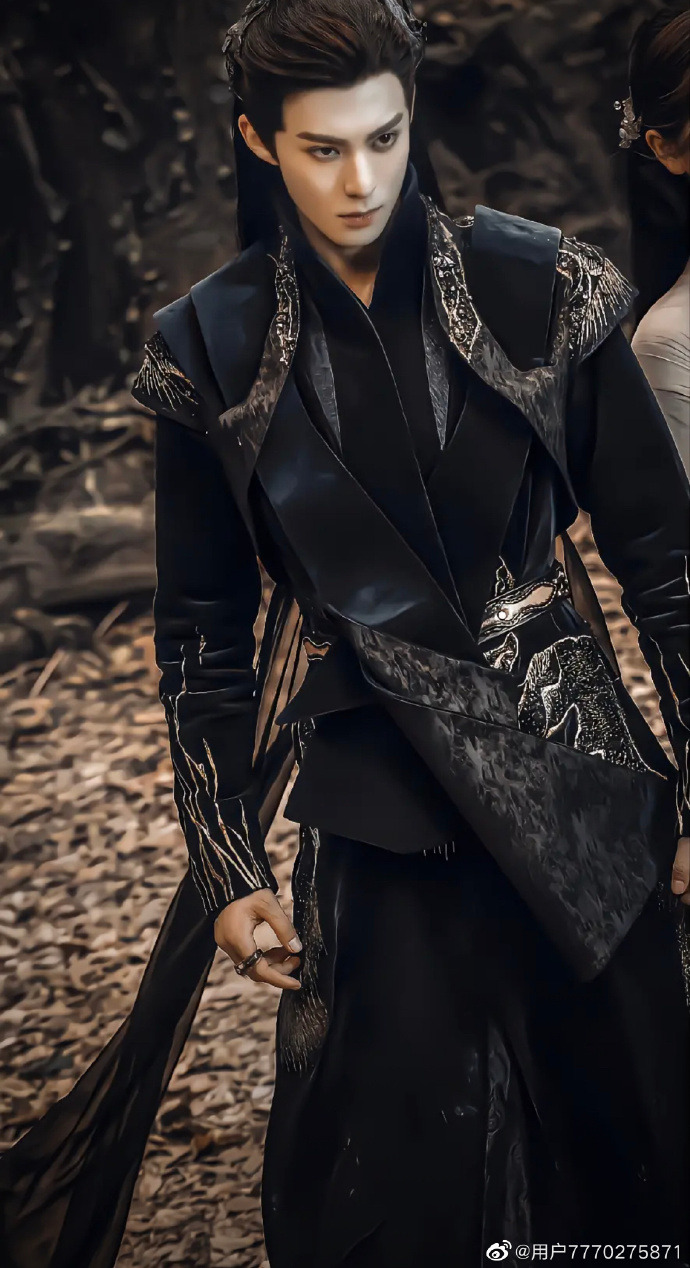
王鹤棣wang hedi as 东方青苍dongfang qingcang
#china#fashion#chinese fashion#cdrama#drama fashion#love between fairy and devil#cang lan jue#i'm watching cang lan jue and immortal samsara at the same time lol#wang hedi#but immortal samsara won't update until next monday#dylan wang
848 notes
·
View notes
Text
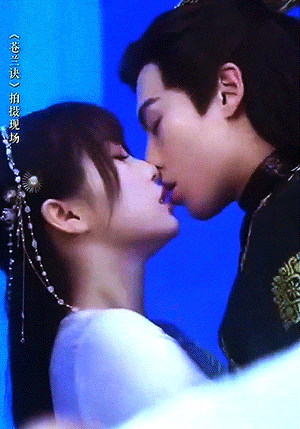
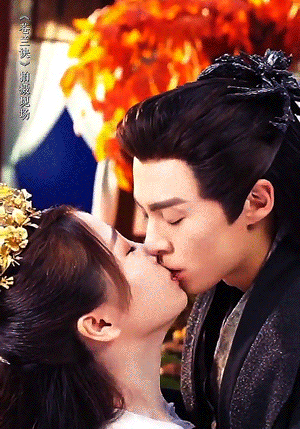


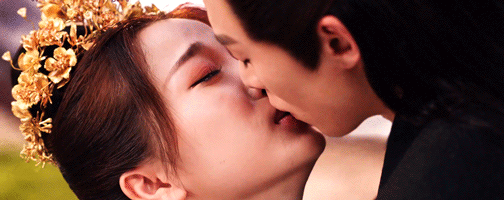





+BONUS
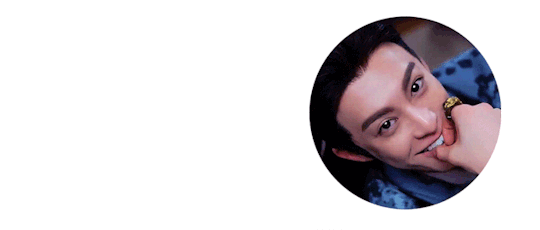
#cdrama#cang lan jue#苍兰诀#xiao lanhua#moon lord supreme#dylan wang#clj#esther yu#wang hedi#dongfang qingcang#东方青苍#love between fairy and devil
242 notes
·
View notes
Text
Shuiyuntian: Why do we hear boss music???
*rock guitar solo intensifies*
DFQC:

#canglan jue#cang lan jue#clj#lbfad#love between fairy and devil#memes#dfqc#dongfang qingcang#dong fang qing cang#东方青苍#苍兰诀#fan art#my art
144 notes
·
View notes
Photo

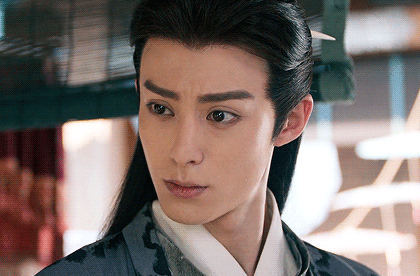
苍兰诀 (2022), Episode 23 - 东方员外
#东方青苍#苍兰诀#love between fairy and devil#wang hedi#dylan wang#dongfang qingcang#cdramaedit#cang lan jue#东方员外 u are my specialest boy. had to much fun going thru a bunch of clips frame ny frame#he has such a special irreplaceable place in my heart . hes different from dfqc to me#and the second gif is soo#its just so.#anyway i would give up organs to see wang hedi as dongfang yuanwai again we didt get enough of it#also making gifs take so long i would never make gifs of anything other than people i find incredibly hot and dont get tired of looking at#sidney talks shit
322 notes
·
View notes
Text

19 notes
·
View notes
Text
a guide to people’s names, titles, and other forms of address in cang lan jue/love between fairy and devil
so for chinese media, i like knowing how to read and pronounce the characters’ names, but when trying to look up the names of the clj/lbfad people, i found the info i wanted rather hard to find. i wanted to know what characters made up their names! how to pronounce them! what their different titles and nicknames meant and what kind of people address them by those names! so i decided to try compiling this info myself, on a whim. it’s taken a HOT minute, and a Lot of scrubbing through the episodes, and it will probably need to be updated and edited as i go about rewatching the show (and improving my chinese :’) aha) but here’s what i got for now! feel free to message me if you have suggestions, edits, corrections, or requests :) hopefully some people find this helpful or interesting – i know some of the things i’ve included here are lost in translation in netflix’s english subtitles.
disclaimer of sorts: for definitions, i used MDBG (mdbg.net) and the Pleco app. also, i’m a native english speaker who’s been learning chinese for a handful of years; my chinese is so-so and i tend to miss things like Connotations™. i’ve watched the show 1.5 times and read 1 page of the book. i did my best :P again, open to suggestions! please be sure to check this source post for the most updated version, as i imagine i’ll be making edits now and again.
this is in no particular order. for each person, i put their official/most commonly used name at the top, then in bullets beneath that i’ve listed definitions for the individual characters in their name, along with any other titles or nicknames that they have been called in the show. any somewhat extraneous information is in italics.
苍兰诀 Cāng Lán Jué
the title of the show and the original novel; 苍 (cāng) refers to Dongfang Qingcang, 兰 (lán) refers to Xiao Lanhua, and 诀 (jué) means “farewell.” i’ve seen some people translate this as the Parting of the Fairy and Devil. (i discovered this halfway through watching the show and it made me SO nervous for how the show would end)
九鹭非香 (Jiǔ Lù Fēi Xiāng) is the author’s name/pseudonym.
东方青苍 Dōngfāng Qīngcāng
character breakdown: 东方 (dōngfāng) = east, eastern. 青 (qīng) = green, sometimes blue or black (or blue-green), young/youth. 苍 (cāng) = dark blue, deep green, ash-gray.
my hypothesized derivation of his name: while i was researching the Black Tortoise (玄武 Xuánwǔ) for this post, I Discovered Something Rather Important. there are four mythological creatures that symbolize the chinese constellations and four cardinal directions. besides the Black Tortoise, there are the White Tiger (白虎 Báihǔ), Vermillion Bird (朱雀 Zhūquè), and the Azure Dragon (青龙 Qīnglóng). the Azure Dragon represents the east. so get this: its epithet is the Azure Dragon of the East. in chinese it is called 东方青龙 (Dōngfāng Qīnglóng) or 东方苍龙 (Dōngfāng Cānglóng). SOUND FAMILIAR?? ISN’T THAT COOL?? i just think that is so cool. yes, the characters are the same as in Dongfang Qingcang’s name. associated with the Azure Dragon are: East (direction), Spring (season), Dawn (time of day), Blue/green (color), and Wood (chinese element). my mind imploded when i discovered this, have a good day.
大魔头 dà mótóu: (used in the book, changed to “da mutou” in the show for reasons? some folks mentioned they might have been censoring “mo”) lit. translates to big devil head/boss/chief, big demon boss
大木头 dà mùtóu: (phonetically similar to da motou, changed to this in the show for Reasons™) lit. big wooden head, big wooden chief/boss, or big log. it can also be translated as big blockhead, as per the netflix engsubs, but it’s not my personal preference — the connotations and intent between “da mutou” and “Big Blockhead” feel very different to me. (i.e., if you’re writing dialogue in a fic, i would recommend Da Mutou over Big Blockhead.) Xiao Lanhua calls him this, saying that it sounds a bit less serious than other, more formal forms of address for him.
东方强 Dōngfāng Qiáng, 大强 Dà Qiáng: the name and familiar nickname Xiao Lanhua calls him in the early days before she knew his identity, after she misheard him saying his actual name; 大 (dà) = big, 强 (qiáng) = strong, powerful
本座 běnzuò: a term used to refer to oneself, like “i/me,” but specifically if that person is very high-ranking; your average person wouldn’t use this word. (the usual word for i/me is 我 wǒ. near the end of the show Dongfang Qingcang transitions to using 我 wǒ with Xiao Lanhua — it’s a notable switch that gets lost in translation! similarly, he also makes the switch during his heated tirade at his father in ep. 18, and switches back to his usual 本座 (běnzuò) after he momentarily collects himself. i could be wrong, but i think he drops the 本座 (běnzuò) when less formality or authority is required or desired, like when Things Get Personal, or when he’s stepping out of his role as Moon Supreme, so to speak.)
尊上 zūnshàng: “my lord,” by far the most common term used to address and refer to Dongfang Qingcang by a majority of characters who aren’t his enemy. also part of the phrase often used to formally greet Dongfang Qingcang, “拜见尊上!” (bàijiàn zūnshàng) “Greetings, my lord!”
月尊 yuèzūn: Moon Supreme, used to refer to Dongfang Qingcang or this position (as in the throne, the seat of the Moon Supreme, the name of this Job) respectfully
月尊大人 yuèzūn dàren: Moon Supreme Lord (netflix); 大人 (dàren) is a title of respect towards one’s superior. this title is often used to address Dongfang Qingcang directly. Xiao Lanhua uses it regularly when she is being kept in the Moon Palace, both in private conversation and in serious public settings. (as the show goes on, she switches to 大木头 (dà mùtóu) in their more private, casual conversations but maintains 月尊大人 (yuèzūn dàren) in situations that warrant greater respect and formality.)
魔尊 mózūn: devil king, demon king; used in the book to address him at times (by Lady Chidi for instance, who in the show calls him 月尊 (yuèzūn), Moon Supreme; were they trying to avoid the word 魔 mó in the show or something, i don’t know)
儿子 érzi, 孩子 háizi: “son/my son” and “child/my child,” respectively. used briefly by Dongfang Qingcang’s father to address his son directly. the other times, he calls him Qingcang.
兄尊 xiōngzūn: a specific form of “brother”; the word that Xunfeng uses to address and refer to Dongfang Qingcang. 兄 (xiōng) = older brother (i.e., only a younger sibling would use this term), 尊 (zūn) = a respectful honorific often appended to these titles, usually signifying high, venerated status. 尊 (zūn) comes up a lot :)
for those who are curious about the reverse: Dongfang Qingcang usually addresses Xunfeng by name. when Dongfang Qingcang refers to Xunfeng with a familial term in ep. 2, he says “我那弟弟,” my younger brother (possibly translated as “that younger brother of mine”). for “younger brother” he uses 弟弟 dìdi, there’s no 尊 (zūn) or other honorific — probably because his younger brother is lower than him in status, so there is no need for an honorific. (it’s also interesting to see that he dropped the 本座 (běnzuò) for this line and used 我 (wǒ), but i’m not sure yet if this implies anything, if it might be a mistake, or if it just sounds more natural. in ep. 10, Dongfang Qingcang calls Xunfeng “本座的同胞弟弟,” “my younger brother (borne of the same parents),” where he does use běnzuò to refer to himself, but this line is a bit sarcastic in tone.)
both Dongfang Qingcang and Xunfeng refer to and address their father with 父尊 fùzūn, which is father + honorific, similar to 兄尊 (xiōngzūn). others usually call their father the previous/former/old Moon Supreme, 老月尊 lǎo yuèzūn. (extra note: Dongfang Qingcang doesn’t use 父尊 (fūzūn) in every case where he is referring to his father — on a rare few occasions he uses the more generic term 父亲 (fùqīn) — but based on my Research and consulting a few people with better chinese than me, this may be because of the way the word “father” is used in the sentence. more of a grammar/syntax thing than something significant to the plot or his character.)
a neat thing that happened in ep. 21, around timestamp 38:15: Dongfang Qingcang accidentally uses 父尊 (fùzūn) when talking about his father to Xiao Run in the mortal realm, which might have implied to Xiao Run that his father is of very high, emperor-like status (very sus, for an undercover agent); however, he catches himself, and switches to 父亲 fùqīn, which is the more common term for “father.” in the engsubs it just looks like he’s stuttering over the word “father.” 父亲 (fùqīn) is also used in modern day to refer to one’s father, but it’s a bit formal and usually used in conversation with other people or in writing; you wouldn’t use this term to address your dad directly, that’s 爸爸 bàba. in case any modern AU fic writers were wondering ¯\_(ツ)_/¯
少尊 shàozūn: Young Lord. used to address Dongfang Qingcang when he was a boy, when his father was still the Moon Supreme.
属下 shǔxià: subordinate. used to refer to himself (in 3rd person) when speaking to Xiyun, when he was acting as her servant after her rebirth. (this term is also used by Shangque with Dongfang Qingcang.)
小仙 xiǎoxiān: lit. little immortal, perhaps translated as low/lower immortal. this isn’t so much a title as a description of his position, when he is pretending to be from Shuiyuntian in front of Xiyun. this scene helped me understand how the word 仙 (xiān) works, actually. Dongfang Qingcang called himself a 小仙 (xiǎoxiān) of Shuiyuntian, to which Xiyun later said, “你身上没有仙气。根本不是仙族。” netflix engsubs wrote, “You have no immortal aura on you. You are not immortal.” and then i thought to myself, but he is immortal though, isn’t he? but 仙 (xiān), meaning “immortal” or “celestial being,” refers more to the race of people in Shuiyuntian rather than the state of immortality. immortal the noun, not immortal the adjective. Xiyun isn’t saying, “you are not an undying entity,” (because he is); what she really means is, “you are not of the fairy realm/tribe.” 仙族 (xiānzú), the term she uses in this sentence, means fairy tribe or immortal realm, referring to Shuiyuntian.
东方员外 Dōngfāng yuánwài: translated as “Mr. Dongfang” by netflix. this is the mortal title Jieli assigned to him, and how he is usually addressed during the mortal realm arc. 员外 (yuáiwài) is an old word meaning “counselor” or “landlord.” Jieli intended for him to be a wealthy businessman. when he is just addressed as 员外 (yuánwài), it is translated to “sir.”
东方兄 Dōngfāng-xiōng: 兄 (xiōng) refers to one’s older brother; this is a familiar term Xiao Run uses to address Dongfang Qingcang when they become Bros™
内兄 (nèixiōng): brother-in-law, wife’s elder brother. Xiao Run calls Dongfang Qingcang this, after Jieli announces that Xiao Lanhua is Dongfang Qingcang’s sister.
郎君 lángjūn: translated by netflix as “young man” and “sir.” it is also an archaic form of addressing one’s husband, and could refer to the playboy of a rich family. however, i think in this show it is a respectful form of address, possibly directed at the head of a household unit (Xiao Run’s father and occasionally Xiao Run himself are referred to with the same term). i’m unsure though.
小兰花 Xiǎo Lánhuā (Orchid)
character breakdown: 小 (xiǎo) = little/small, but commonly used in front of names and nicknames for ... reasons i am too lazy to explain here, but other people have definitely written about it if you’d like to look it up. 兰花 (lánhuā) = orchid.
小花妖 Xiǎo Huāyāo: lit. little flower demon, little flower monster; the name that Dongfang Qingcang initially calls Xiao Lanhua, when he still doesn’t like her. netflix subs say “little flower spirit,” but to me this phrase loses a bit of the evil/demon/monster connotation — i feel like Xiao Huayao is not meant to be particularly respectful or polite :’) interestingly, i noticed in ep. 10 that Shangque calls her 小花妖 (Xiǎo Huāyāo) to her face, perhaps because she was annoying him, but he calls her Xiao Lanhua (Orchid) in his private conversation with Dongfang Qingcang shortly after. forms of address really have so many potential implications…
兰花仙子 Lánhuā xiānzi: Fairy Orchid; she is sometimes addressed as just 仙子 (xiānzi), “fairy,” including in situations where her name is not known by the speaker
仙族女人 Xiānzú nǚrén: Fairy Tribe woman (used by some Moon Tribe people to address her in third person, not when speaking to her directly)
月主 yuèzhǔ: translated as Moon Queen; zhǔ on its own means host, owner, or master. this is how people of the Moon Tribe address Xiao Lanhua after she undergoes her trip to Non-Abidance Cave to marry Dongfang Qingcang.
息芸 Xīyún: her name as the goddess. 息 (xī) = breath, or to cease/stop/rest; 芸 (yún) mainly refers to the plant Ruta graveolens, the common rue, as far as i can tell
息山神女 Xīshān shénnǚ: Goddess of Xishan; 山 (shān) = mountain
息兰(族的)神女 Xīlán (zú de) shénnǚ: Xilan Goddess (without parentheses) or Goddess of the Xilan Tribe (with parentheses, used by Xiao Lanhua at one point to refer to herself). Goddess of Xishan is the more common title, compared to Xilan Goddess, but both have been used.
breakdown of previous: 息兰 (xīlán) = the name of the tribe, containing the words for “breath” and “orchid”; 族 (zú) = the word for tribe, clan, race, nationality, ethnicity, etc.; 的 (de) is a possessive particle; 神女 (shénnǚ) = goddess (lit. god-woman; it’s also slang for “prostitute” but that doesn’t come up in this show)
故人 gùrén: old friend (literary); how the Xuanwu god addresses Xiao Lanhua/Xiyun. (this word is also used to refer to the deceased/departed, but not in this context.)
when referring to Xiao Lanhua’s plant form, people in the show use (小) 兰花草, (xiǎo) lánhuā cǎo. 草 (cǎo) = grass. it means (little) orchid plant. not every mention includes the “little.”
her familial relationship to Xunfeng: in ep. 28 Dongfang Qingcang says, “If you still regard me as your brother, then she is your sister-in-law.” 她就是你的阿嫂。阿嫂 (ā-sǎo) is an archaic term for sister-in-law, specifically for one’s older brother’s wife. if Dongfang Qingcang and Xiao Lanhua were married, Xunfeng might call her this, but this never happens in the show. Xie Wanqing, similarly, also refers to Xiao Lanhua as her future 阿嫂 (ā-sǎo). in a modern AU, Xunfeng would call his sister-in-law either 嫂子 (sǎozi) or 大嫂 (dàsǎo). my mom is a native speaker and says the latter is more likely. it refers to the oldest brother’s wife, the “big” sister-in-law, even if she is younger than the speaker.
on that note, the word for “wife” is 妻子 (qīzi), and it’s sometimes used in the show when referring to Xiao Lanhua per her relationship to Dongfang Qingcang. Dongfang Qingcang himself often uses 月主 (yuèzhǔ), Moon Queen, in lieu of “wife.” a couple exceptions: when he’s pretending Xiao Lanhua is his wife to trick Xiao Run, the word he uses for “wife” is 内子 (nèizǐ). when he’s speaking to Changheng in his dream state, he does use 妻子 (qīzi) to refer to her as his wife.
兰花娘子 Lánhuā niángzǐ: Lady Orchid. commonly used to address Xiao Lanhua in the mortal realm. 娘子 (niángzǐ) is a polite form of address for a young woman, at least in Ye Olde Days™; it can also be used to address one’s wife, which Dongfang Qingcang does when he’s pretending that Xiao Lanhua is his wife to trick Xiao Run. there, 娘子 (niángzǐ) is translated as “honey.”
女侠 nǚxiá: heroine, lit. woman-hero; 侠 (xiá) can mean chivalrous, brave, heroic. this is how Xiao Run calls her when he first meets her, thinking she’s The One.
画中仙 (子) huàzhōng xiān(zi): fairy in the painting. Xiao Run calls her this early on after meeting her, and whenever he refers to the fairy in his dreams.
月尊副将 觞阙 Yuèzūn fùjiàng Shāngquè (Moon Supreme’s lieutenant, Shangque)
character breakdown: 副将 (fùjiāng) = deputy general, translated by netflix as “lieutenant.” 觞 (shāng) = a wine cup or goblet, or to propose a toast. 阙 (què) = an archaic term for the watchtowers on either side of an (imperial) palace gate.
Dongfang Qingcang, Xiao Lanhua (later), and Xunfeng address Shangque by just his name. Jieli later refers to Shangque by name but addresses him with “stupid black dragon,” usually.
黑龙大哥 hēilóng dàgē: lit. black dragon big brother, translated by netflix as just “Black Dragon.” used by Xiao Lanhua and Jieli to address Shangque, at least in the earlier stages of knowing him — Xiao Lanhua eventually just calls him Shangque, and Jieli switches to “stupid black dragon.” 黑龙大哥 (hēilóng dàgē) is still a respectful form of address, but the appended 大哥 (dàgē) gives a bit of familiarity to it that i feel like “Black Dragon” alone doesn’t quite convey. (Jieli calls him this name as soon as she meets him. my guess is that she is trying to sound close to him, as a ploy to appeal to familiarity in order to persuade him not to throw her in prison.)
觞阙哥哥 Shāngquè gēge: Jieli calls him this at least once in the show, when she’s trying to be cute and wheedle a favor out of him.
觞阙大人 Shāngquè dàren: Lord Shangque (大人 (dàren) is a title of respect toward one’s superior). palace staff address Shangque with this.
蠢黑龙 chǔn hēilóng: stupid black dragon. this is the affectionate insult Jieli uses to address Shangque. 蠢 (chǔn) means stupid, foolish, clumsy, or dull.
属下 shǔxià: subordinate. used by Shangque to refer to himself (in third person) when speaking to Dongfang Qingcang.
将军 jiāngjūn: general. the palace doctor calls Shangque this. it’s odd to me because Shangque was first introduced as “deputy general/lieutenant” — i’m not sure which is more accurate for the name of his position. unless Shangque got a mid-show promotion when i wasn’t looking.
结黎 Jiēlí
character breakdown: 结 (jiē) = (of a plant) to produce fruit; alt. pronunciation jié means to tie, knot, connect, bind. 黎 (lí) = many, multitude; (literary) black, dark; a surname; the Li ethnic group.
掌柜的 zhǎngguìde: shopkeeper, manager of a store. netflix translated this as “Miss” when the delivery man addresses Jieli in ep. 2.
长珩战神 Chánghéng zhànshén (God of War, Changheng)
character breakdown: 长 (cháng) = long or length; always, forever, constantly (not to be confused with zhǎng, an alternate pronunciation of the same character, with a different meaning). 珩 (héng) = an archaic term for the “top gem of a girdle-pendant (as worn by aristocrats and high officials)” (thank you, Pleco). 战 (zhàn) = war, battle, fight. 神 (shén) = god, immortal. 战神 (zhànshén) is his God of War title, and Lady Chidi’s as well.
长珩仙君 Chánghéng xiānjūn: Lord Changheng. fairies call him this, and he is often directly addressed just as 仙君 (xiānjūn) mid-conversation. 仙君 (xiānjūn) lit. means immortal ruler, as a title it’s usually translated to “Lord/my lord” or similar.
Supreme Liyuan and Master Sansheng call him 长珩战神 (Chánghéng zhànshén), in the first episode.
罪仙长珩 zuìxiān Chánghéng: immortal criminal Changheng :(
萧润 Xiāo Rùn: Changheng’s name in the mortal realm arc. 萧 (xiāo) is a surname, and a word that means miserable, desolate, or dreary. 润 (rùn) means moist, sleek; to embellish or enhance; or profit, remuneration.
润郎 Rùn-láng: the friendly name by which Qu Shui addresses Xiao Run, and by which Dongfang Qingcang also addresses Xiao Run when they are being Bros™. (however, when referring to Xiao Run privately, Dongfang Qingcang just calls him Xiao Run.)
萧家二郎 Xiāojiā èrláng: translated by netflix as Mr. Xiao, used to refer to Xiao Run when his gifts were formally presented to Lady Wanqing. i might translate this as “the second child/son of the Xiao family,” but to be honest, the definitions i’ve found for 郎 (láng) are a little hazy to me. i could be wrong. but Xiao Run does have an older brother, who is referred to as 萧家大郎 (Xiāojiā dàláng), which i would translate as “the eldest young master of the Xiao family.” Xiao Run’s father, similar to Dongfang Qingcang, is referring to as 萧家郎君 (Xiāojiā lángjūn), which is translated to “Master,” presumably as the head of house.
萧家郎君 Xiāojiā lángjūn: and on that note, Xiao Run is also addressed as 郎君 (lángjūn)! not often, but on at least a couple occasions, such as by Lady Wanqing and Xiao Lanhua. this form of address is still translated by netflix as Mr. Xiao. again, in other situations Xiao Run is referred to as 二郎 (èrláng), and his father is referred to as 郎君 (lángjūn). i honestly don’t know how the word 郎 (láng) works at this point.
萧公子 Xiāo-gōngzi: also translated as Mr. Xiao. could also be “Young Master Xiao.” used to address him directly.
丹音仙子 Dānyīn xiānzi (Fairy Danyin)
character breakdown: 丹 (dān) = cinnabar, red, powder. 音 (yīn) = sound, musical note, tone, noise.
��水 Qū Shuǐ: Danyin’s name in the mortal realm arc. 曲 (qū) is a surname, and a word that means bend/to bend. 水 (shuǐ) = water.
蛐蛐儿 Qūqu-ér/Qūqur: it means Cricket, and it contains a homonym for the first character of Qu Shui’s name. this is Xiao Run’s familiar nickname for Qu Shui.
容昊仙君 Rónghào xiānjūn (Lord Ronghao)
character breakdown: 容 (róng) = to hold, contain, allow, tolerate; appearance, look, or countenance. 昊 (hào) = vast, limitless; the vast sky. interesting potential interpretations for his name! (both also happen to be surnames on their own.)
仙君 xiānjūn: Lord, my Lord, in his case. this is how the fairies address him.
阿昊 Ā-Hào: what Lady Chidi calls him. 阿 (ā) is placed as a prefix before monosyllabic names or kinship terms to indicate familiarity; this form of address shows that Lady Chidi is close with her apprentice.
海市主 Hǎishì zhǔ: Lord of Haishi; same 主 (zhǔ) as in 月主 (yuèzhǔ), Moon Queen, meaning “host” or “master”
主上 zhǔshàng: Lord, my lord, the lord. this is how he is addressed and referred to in his Lord of Haishi persona, such as by Dieyi and other Haishi underlings.
海市 (Hǎishì) is made up of the words for “sea/ocean” and “city”; together, they mean “mirage.”
also the 昊 (hào) in 容昊 (Rónghào) is the same as the 昊 (hào) in Haotian Tower, where Dongfang Qingcang was imprisoned. 昊天塔 (Hàotiāntǎ). “the vast, limitless sky” would be my translation of Haotian.
战神 赤地女子 zhànshén Chìdì nǚzǐ (God of War, Lady Chidi)
character breakdown: 赤地 (chìdì) = barren land. there’s an idiom that goes 赤地千里 (chìdì qiānlǐ), meaning “a thousand li of barren land — a scene of utter desolation (after a drought or insect plague)” (copied from Pleco). this definition reminds me of the Xuanxu Realm. hmm … thoughts for later. anyway, 女子 (nǚzǐ) = woman, female.
i’ve seen some translations of her name as “Chidi Woman” but i much prefer “Lady Chidi”
师父 shīfu: Master. this is how Ronghao addresses her (same as Xiao Lanhua towards Master Arbiter Siming).
谢惋卿 Xiè Wǎnqīng: Lady Chidi’s name during the mortal realm arc. 谢 (xiè) is a surname, and also means “to thank,” or sometimes “to apologize.” 惋 (wǎn) is a sigh, or to heave a sigh. 卿 (qīng) has several archaic meanings: high-ranking official, term of endearment between spouses, term used by the emperor for his subjects, or an honorific. (oh, where would i be without my dictionaries…)
惋卿娘子 Wǎnqīng niángzǐ: Lady Wanqing, commonly used to address Xie Wanqing in the mortal realm. when she is addressed as 娘子 (niángzǐ) alone, it is translated as “my lady.” (again: 娘子 (niángzǐ) is a polite form of address for a young woman, at least in Ye Olde Days™; it can also be used to address one’s wife, but that isn’t usually its purpose in this show.)
月族首领 巽风 Yuèzú shǒulǐng Xùnfēng (Moon Tribe Chief, Xunfeng)
character breakdown: 巽 (xùn) = to obey; one of the Eight Trigrams 八卦, symbolizing wood and wind; ☴; ancient Chinese compass point: 135° (southeast) (this definition copied directly from MDBG because all these definitions seem cool). 风 (fēng) = wind
巽风殿下 Xùnfēng diànxià: 殿下 (diànxià) is an honorific, usually meaning “Your Majesty” or “Your Highness”; Xùnfēng diànxià basically means “Your Highness Xunfeng.” he is sometimes addressed as “dianxia” alone, it’s not always Xunfeng dianxia.
to clear up possible confusion: Xunfeng is introduced in ep. 10 with the title card “Moon Tribe Chief,” per the netflix engsubs: 月族首领 (Yuèzú shǒulǐng), Moon Tribe leader/head/chief. this occurs after Dongfang Qingcang is reinstated as Moon Supreme, but in ep. 2 and ep. 10 it was mentioned that Xunfeng was made Moon Supreme (月尊 yuèzūn) upon Dongfang Qingcang’s presumed death 30,000 years earlier. nobody in the show, as far as i’ve noticed, calls or refers to Xunfeng as 首领 (shǒulǐng). the kings of the North and South are also introduced with the title 首领 (shǒulǐng), while we’re on the subject.
Dongfang Qingcang and Xiao Lanhua call him Xunfeng; Shangque and most other people call him 巽风殿下 (Xùnfēng diànxià) or just 殿下 (diànxià).
random note: if you’re like me and some of my friends who have watched this show after watching or reading Tian Guan Ci Fu/Heaven Official’s Blessing, it might seem like 殿下 (diànxià) is a term specific to the prince or crown prince-type figure. turns out, that’s not exactly the case. Xie Lian’s title, 太子殿下 tàizǐ diànxià, marks him as the crown prince. 太子 (tàizǐ) = crown prince. but Xunfeng doesn’t have this title, he’s just Your Highness, 殿下. anyway, this was kinda like that one twitter meme for me. “guy who has only seen tgcf watching any other chinese drama with a prince in it: so when are they gonna call him taizi dianxia?”
another note: it seems to be somewhat common practice on tumblr to refer to his character as Dongfang Xunfeng, but i should mention that nowhere in the show does anyone append Dongfang to his name. for several reasons (see my reblog), i don’t believe Xunfeng has a last name, and i don’t think Dongfang operates like one. it’s likely that Dongfang Qingcang is just the guy’s name, and Xunfeng is just another guy’s name, and that the two brothers don’t necessarily have a family name. BUT, i will say, if you’re looking to bequeath a last name to a modern AU Xunfeng, Dongfang probably works. “Dongfang” is an actual last name, in other contexts.
水云天 帝君 云中君 Shuǐyúntiān dìjūn Yúnzhōng-jūn (Shuiyuntian Emperor, Lord Yunzhong)
character breakdown: 水云天 (Shuǐyúntiān) = lit. water, clouds, sky/heavens. 帝君 (dìjūn) = emperor. 云 (yún) = cloud, 中 (zhōng) = middle, amidst, among; i might translate the meaning of his name as Amidst the Clouds.
云中君 Yúnzhōng-jūn: Lord Yunzhong. this is his usual title when people refer to him.
君上 jūnshàng: my lord. used to directly address Yunzhong. (yes, similar to the 尊上 zūnshàng used to directly address Dongfang Qingcang; “jun” and “zun” really abound with this show, but they are different terms. don’t ask me why some characters have jun and others have zun, i only have a vague notion.)
兄君 xiōngjūn: a specific term for “brother,” used by Changheng to address and refer to Yunzhong; again, similar to how Xunfeng addresses + refers to Dongfang Qingcang with 兄尊 (xiōngzūn)
in Changheng’s trial (perhaps a more official setting), Lord Yunzhong refers to his and Changheng’s father as 父神东君 fùshén Dōng-jūn, Lord Dong (lit. father-god Dong-lord) and Changheng’s mother as 母神 mǔshén (lit. mother-god). in other settings, Changheng refers to Lord Dong as 父君 fùjūn, similar to how Dongfang Qingcang and Xunfeng call their father 父尊 fùzūn.
澧沅仙尊 Lǐyuán xiānzūn (Supreme Liyuan)
character breakdown: 澧 (lǐ) = a surname, as well as a river in Hunan Province called Lishui River. 沅 (yuán) = the name of the Yuan River, another river in Guizhou and Hunan. funnily enough, both rivers flow into Dongting Lake. don’t ask me if that means anything significant, though.
仙尊 xiānzūn: Lord or my lord, in his case. similar to 仙君 (xiānjūn).
爹 diē: “father,” as addressed by his daughters. (please, it is not pronounced like the english word “die” … dee + ehh = dyeh, kinda like that)
司命仙君 Sīmìng xiānjūn (Master Arbiter/Lady Arbiter)
character breakdown: 司 (sī) = a department; to manage, take charge of, or attend to; it’s also a surname. 命 (mìng) = life, fate, destiny. so she Manages Fates, basically.
仙君 xiānjūn: Lord/Lady/Master. this word haunts me
司命星君 Sīmìng xīngjūn: also translated to Lady Arbiter, but there’s a new title this time! this is what Changheng and Dongfang Qingcang call her when they pay her a visit, near the end of the show. 星 (xīng) means star, or heavenly body. so this title means that she’s a lady of the heavens, or something similar. i wonder if this is because she was imprisoned and no longer an immortal of Shuiyuntian, where everyone is referred to with the word 仙 (xiān).
师父 shīfu: master (as addressed by Xiao Lanhua; the chinese subs say 师父, it’s a variant of 师傅, also pronounced shīfu)
sometimes addressed as just 司命 (Sīmìng), such as by Shangque and Dongfang Qingcang at the beginning of the show. by the end of the show, Dongfang Qingcang still refers to her as 司命 (Sīmìng) when speaking with Changheng, but addresses her with her title 司命星君 (Sīmìng xīngjūn) when speaking to her directly. Changheng, in contrast, keeps using her title even when she is not present.
上仙 shàngxiān: high immortal. less of a title and more of a description of her position in Shuiyuntian, e.g., “she is a high immortal of Shuiyuntian.”
海市流芳阁主 蝶衣 Hǎishì Liúfāng-gézhǔ Diéyī (Pavilion Master, Dieyi)
character breakdown: 蝶 (dié) = butterfly. 衣 (yī) = clothes, clothing; cover, skin.
阁主 gézhǔ: Pavilion Master. this is how most of the Haishi underlings address Dieyi.
流芳阁 (Liúfānggé) = Liufang Pavilion. the chinese subs use 留 instead of 流 sometimes, but for all these names and titles i default to the title cards written onscreen, not the subtitles.
三生仙君 Sānshēng xiānjūn (Master Sansheng)
character breakdown: 三 (sān) = three, 生 (shēng) = life, birth. in buddhism, 三生 (sānshēng) refers to three lives — past life, present life, and next life.
仙君 xiānjūn: Lord/Lady/Master, pretty much. if you’ve read this far you should kinda get what this means by now, right? and yes, the term is gender neutral, if anyone was wondering. a lot of these titles are.
三生姑姑 Sānshēng gūgu: Aunt Sansheng; the fairies call her this. (姑姑 gūgu refers to one’s paternal aunt, but can also be a familiar term for an aunt-like figure who is not related by blood.)
元龟 玄武 yuán guī Xuánwǔ (the Great Turtle, Xuanwu)
this dude’s got whole wikipedia pages dedicated to him but i’ll try to sum it up
玄武 (Xuánwǔ) literally means Black Warrior, Dark Warrior, or Mysterious Warrior. it is often translated as the Black Tortoise, though the name contains no animal-related words — this is just due to how it’s usually depicted. the Xuanwu is one of the four symbols of the chinese constellations, each being a guardian of one cardinal direction. the Black Tortoise’s usual epithet is 北方玄武 (běifāng Xuánwǔ), the Black Tortoise of the North. the other three are the Azure Dragon of the East (!! Dongfang Qingcang??), the White Tiger of the West, and the Vermillion Bird of the South. each symbol represents seven of the 28 Mansions; the Xuanwu would be the seven mansions of the north sky (or the god of the north sky in Taoism). each symbol is also associated with a season, time of day, and chinese element, but i’ll let you look those up yourself. anyway. tl;dr he’s a cool dude with a lot going on.
上古神灵玄武 shànggǔ shénlíng Xuánwǔ: netflix’s translation is “Great Turtle. Xiao Lanhua calls him this when she first meets him. i might translate this title as “Ancient God Xuanwu” or similar. 上古 (shànggǔ) = distant past, ancient times, remote ages, antiquity. 神灵 (shénlíng) = god, deity, divinity, spirit, spiritual being, supernatural entity. Xiao Lanhua also addresses him by just 神灵 (shénlíng), a moment later. (it’s translated as “God” — no, not that one.)
玄武上神 Xuánwǔ shàngshén: God Xuanwu, as addressed by Xiyun. could perhaps be translated as High God Xuanwu.
元龟 yuánguī: translated by netflix as the Great Turtle. Sansheng refers to him with this term. the place where we see the Xuanwu is called 玄武幻境 (Xuánwǔ huànjìng), which basically means “Xuanwu dreamland.”
凶神太岁 xiōngshén Tàisuì (Evil God Taisui)
character breakdown: 凶神 (xiōngshén) = evil god; demon, fiend, devil. 太岁 (tàisuì) = a deity, the God of the Year, who was believed to change his dwelling on earth annually; also an archaic name for Jupiter, and a nickname for the most powerful man in a locality. (i think in this show he’s just some kind of evil deity named Taisui, not necessarily the God of the Year described in the dictionary.)
乌姑 Wū-gū (Ms. Wu, Dongfang Qingcang’s childhood caretaker who taught him woodcarving and music)
character breakdown: 乌 (wū) is a surname, but it can also mean “crow” or “black/dark.” 姑 (gū) refers to one’s aunt, a father’s sister; here, it is Dongfang Qingcang’s familiar term for her. (same concept as with Aunt Sansheng, although i’m not sure why it’s translated to Ms. Wu instead of Aunt Wu, especially since she seemed to have a very close relationship with Dongfang Qingcang. the singular 姑 (gū) might convey a bit less familiarity or closeness In Olden Times compared to 姑姑 (gūgū), and Dongfang Qingcang as the young lord might have had to maintain that marginal bit of distance for politeness and tradition and royalty reasons, but i could very much be mistaken, or just reading into it more than necessary.)
look, i know she’s not a major character but she was important to ME, ok! so here’s her name. hope someone writes a fic involving her someday.
长渊 Chángyuān (Arbiter’s dragon husband)
character breakdown: 长 (cháng) = long/length; forever, always, constantly. 渊 (yuān) = deep pool; deep; profound.
罪龙长渊 zuìlóng Chángyuān: convicted dragon Changyuan, dragon criminal Changyuan. same 罪 (zuì) as in “immortal criminal,” 罪仙 (zuìxiān).
aaaaaall righty, i am done for now. (it’s been over a week… phew…) again, i’ll update this if i discover new things or receive suggestions. thanks! :D
337 notes
·
View notes
Photo


love between fairy and devil | 东方青苍 x 长珩仙君
dongfang qingcang x lord changheng
#love between fairy and devil#cang lan jue#dylan wang#zhang linghe#cdrama#chinese drama#rubygifs#lmao i'm not watching this drama but like... b站 gave me an fmv...#all the danmei tropes are here i wanna cri
399 notes
·
View notes
Text
Branching off a convo in the LBFaD server, I wanna drop some of my own notes about the following conversation, as translated by Netflix subs:
Dongfang Qingcang: This should be the third time you drugged my wine.
Xiao Lanhua: You remember it clearly. Do you remember what you said then? You said that as long as I gave you the wine, no matter what's inside, you will drink it.
Dongfang Qingcang: That is not a promise.
Xiao Lanhua: But since you said that, you agreed.
There are no major problems with the translation, but there are a few things the original does for flavor that get lost. This post is just something I've had a lot of FEELINGS and THOUGHTS about because I re-translated it for a gifset, and will be heavy in nitpicky detail.
Here's the original.
东方青苍:这应该是第三次在本座的酒里下药了。
小兰花:记得还真清楚。那你还记不记得你说过的话?你说过只要是我给你的酒,无论里面有什么,你都会喝下去的。
东方青苍:这又不是一句承诺。
小兰花:但既然是你说的,就是你答应的
Breaking it down line by line,
This should be the third time you drugged my wine.
这应该是第三次在本座的酒里下药了。
No notable comments on this one. The "my" Qingcang uses is "benzuo," as usual. The feeling of 应该, which is translated by Netflix as "should," I chose to translate "has to be," which I felt captures its more casual yet accusatory nature? But it's really very very minor.
You remember it clearly.
记得还真清楚。
I think the feeling of "真" is really hard to capture here. It means "truly", and modifies the "clearly," but lends an element of playfulness to Xiao Lanhua's words. And then "记得" is in one sense "remember" like Netflix says, but the feeling here is more like "keep track of," or "keep track of the score." The feeling of this line to me is like, "Oh? You've kept track so well."
Do you remember what you said then?
那你还记不记得你说过的话?
The main thing that made retranslating this line tough is that the word she uses for remember, "记得", is the same as the one she uses for "keep track of" above. To me, the feeling of these two lines together is something like, "Oh, so you remember that so clearly. Then do you also remember this?" It's very playful in a teasing sort of way.
So the repetition is important in the Chinese, but in English the two instances of "记得" should really different: the first is "keep score" and the second is "to remember." So it's a little difficult to balance the two requirements. I ended up compromising with "remember the score…remember what you said."
I also think one misleading thing happening here is that the Chinese leads with "Then," which Netflix seems to have moved to the end of the sentence? Or maybe they skipped it altogether and just added the "then" to mean "in the past."
And, yeah, "你说过的话" really does imply that Qingcang did say something verbally, and not in gestures or anything. "The words that you have said."
You said that as long as I gave you the wine, no matter what's inside, you will drink it.
你说过只要是我给你的酒,无论里面有什么,你都会喝下去的。
Nothing wrong with this one, though the Netflix English could be smoother. I think the first phrase is more accurately translated as "You've said that as long as it was wine that I gave you…" with the emphasis on the wine (from Xiao Lanhua), not the giving.
That is not a promise.
这又不是一句承诺
I think I do take issue with one aspect of the Netflix translation here, and that is the translation of 是 to present-tense "is" instead of past-tense "was," because they really are discussing a statement that was made in the past. Chinese grammatically doesn't distinguish between past and present except in very emphasized cases (like the "说过"/"said before" above), and often to readers it doesn't matter, but in this case I think the context is very clear.
If I were to translate this line word-by-word, I would say: "this also not was an utterance-of promise-to-do." The word "又," which I've glossed as "also," really has the function of emphasis in this sentence, lending the whole thing as flavor of "come on," or "you know that's not what I meant."
But it's out-of-character for Dongfang Qingcang to say, "come on," and, "you know that wasn't a promise," is too explicitly saying what "又" is implying, so when I translated I chose to say, "That wasn't supposed to be a promise," which sort of gets the implicit accusation across. However I am not still not super happy with that choice.
But since you said that, you agreed.
但既然是你说的,就是你答应的
Maybe I am missing something cultural, but to me this line in Chinese sounds as much like Xiao Lanhua strong-arming Dongfang Qingcang as it does in English.
Two minor notes about flavor:
1) There's the rhythm of repeated structure which is not as evident in the translation. Taking out the first character, meaning "but":
既然是你说的,就是你答应的
jiran shi ni shuo de, jiu shi ni daying de.
"Since it's what you said, it's what you agreed," would be a way to translate it while keeping the rhythm intact.
2) To me it has a feeling of, "Put your money where your mouth is, my guy."
-
Anyway, that's it. The little feelings in them were really hard to translate, and I wanted to say some things about the nuances. I think the actors' expressions and tones of voice probably go a long way in capturing some of the things the subtitles lost, though.
44 notes
·
View notes